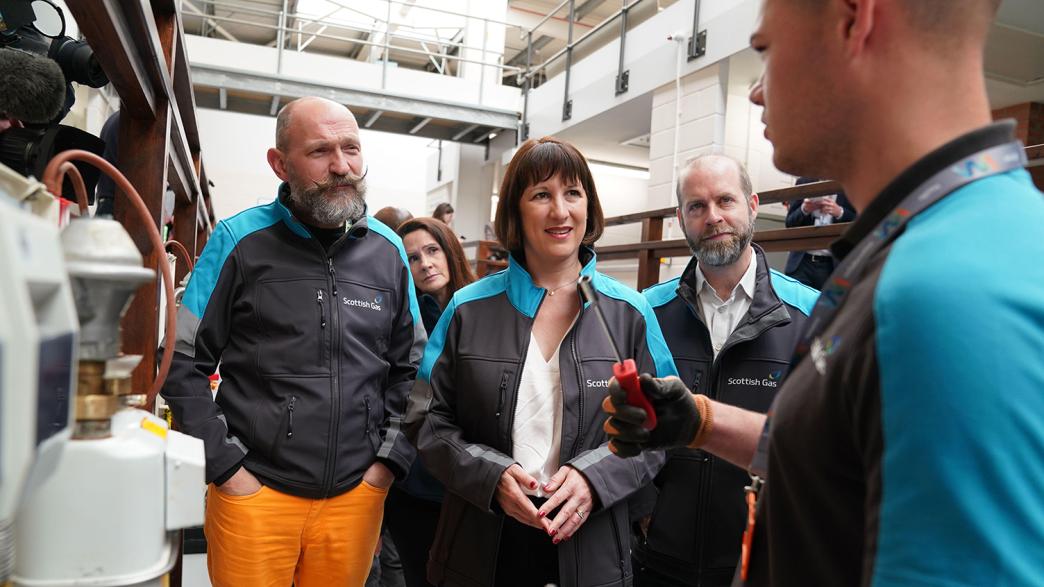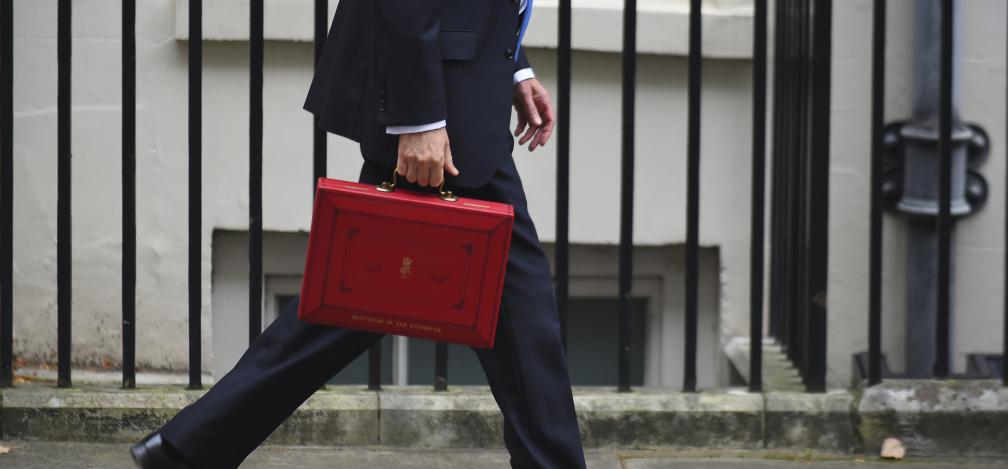Four things we learned from Rachel Reeves’ Mais lecture
What is the shadow chancellor’s vision for the economy?

The IfG’s public finances team found much to welcome in the shadow chancellor’s big lecture – but also plenty of questions that need answering
The annual Mais lecture is an opportunity for leaders in economics and finance – chancellors, central bank governors, sometimes prime ministers – to set out their vision. No individual has ever given more than one of these lectures, so they are an important moment. This week it was Rachel Reeves’ turn.
1. Reeves demonstrated her commitment to industrial strategy but not everyone will be convinced about her methods for delivering it
Rachel Reeves is set to be the first chancellor in generations to enter the Treasury using the phrase “industrial strategy” in anything but a derogatory way. No aspect of economic strategy can prosper in the face of hostility from the Treasury, so Reeves’ support (and enthusiasm for terms like “securonomics”) is necessary if businesses are to invest in line with Labour’s industrial policy.
Necessary, but far from sufficient. The kind of transformation Labour has called for demands active and effective intervention, at a time when the fiscal resources are simply not there for doing this in a traditional, state-dominated way. Without mentioning the dread number “£28bn” – the now-abandoned target for climate-change spending that would have provided the fuel for industrial strategy too – Reeves’ lecture is an acknowledgement of this challenge. She could not be clearer that she does not intend to achieve what she wants through the liberal use of taxpayer money – even if there was plenty at hand. Instead, she intends to bring about transformation through a three-pronged approach: stability, investment (from business), and reform.
In that word “investment” lies the success or failure of Labour’s prospective industrial strategy. Not being able to finance its plans fiscally, a future government is going to rely on encouraging business to do so instead. If business does not step up, the approach will have failed.

This is not just a point about balance sheet capacity, but also information. When she called for “an approach that recognises the informational and capacity constraints of government”, Rachel Reeves confirmed herself to be the sort of politician to have read the economist Friedrich Hayek, who warned of the impossibility of any central planner knowing enough to direct resources efficiently. It is not just about the Treasury being unable to afford the capital spending needed to transform the economy into something more productive and less polluting, but the government’s inability to know exactly where scarce capital ought to go.
The suggested solution to the information problem is the concept of “partnership” – how working together with business can help the government to assess the strengths of the economy, the barriers to investment and where it makes more sense to trade with other countries. The government’s side of the bargain will be to provide the long-term strategic direction, political stability and selective policy intervention, which business in return repays by risking shareholder funds on the right investments.
Can this work? To turn to another economist, John Maynard Keynes once wrote “anything we can do, we can afford”. In theory a business-financed industrial strategy is possible. Government has many more tools than outright grants to induce investment: regulations, procurement policy, tax. Moreover, as the economist Professor Dame Diane Coyle has observed, successful examples have relied on “bottom-up” processes for generating ideas: listening, not just telling.
The concern must be that simply promising to engage more constructively with business does not straightforwardly answer the capital-allocation problem that Reeves alludes to. Her beefed-up Enterprise and Growth Unit (EGU) needs to acquire the skills to distinguish valuable insights from self-interested lobbying. The Treasury will need to make better and more consistent use of the experience and contacts that exist across all the other departments to do this effectively. Listening is a difficult skill. The strategy will also need an enduring means of resisting the anti-growth tendencies of the political system. Planning reform has repeatedly failed not because the EGU failed to think of it, but from the opposition of politicians unwilling to bear the short-term costs. Utility investment has been weak at times because other politicians see more votes in a promise of lower bills than more infrastructure. These are all tests that Labour can only convincingly pass when in government.
2. Creating a pro-growth Treasury will require more than beefing up a particular unit
Treasury officials will have recoiled at Reeves’ suggestion – lifted from one of our own reports – that the department’s Enterprise and Growth Unit (EGU), which was established by New Labour to generate new ideas for driving economic growth, is ‘underpowered’. They will do so with apparently good reason: in numbers that unit has grown by an order of magnitude in its 30-year existence to over 200 officials today.
The expansion of this team – and of the separate Economics Group – is a good thing and shows that the department is committing a great deal of resource to thinking about growth. However, our research suggested that the growth function is underpowered for reasons beyond headcount.
The first is that the EGU’s function has morphed from its original role. It was initially set up to generate new ideas for how to drive growth – that was the sole responsibility of all its officials, of any seniority. But much of the unit’s recent growth has been driven by the migration of spending teams from the public spending group to the EGU. The team that retains the unit’s original function of conducting research into growth and productivity comprises around 20 staff. Housing officials conducting research on growth along with those making spending allocations under the same senior leadership will have its merits, but those who worked under Gordon Brown argued that the original unit’s effectiveness was derived from not having incentives to manage down spending like other teams in the Treasury.
Rachel Reeves also pointed to the exclusion of the EGU from the management of fiscal events, which might generate an important bias against growth getting a fair hearing. This was true in the past – insiders have talked of there being a ‘fiscal triangle’ comprised of the groups responsible for fiscal strategy, budget strategy and public spending being the key influences, with some engagement with Number 10.
Again, Treasury officials nowadays insist this is out of date; the triangle is more of a diamond (or rhombus), with economic growth as the fourth point. Those arguing for resources aimed at boosting growth gain more of the chancellor’s ear than other ‘spenders’ outside the department, as is evident from pro-labour supply measures unveiled in the last two budgets. However, a structural problem remains: growth is not properly embedded into the framework as fiscal rules and public spending have been. What matters is what scores in the next five years. Policies with longer term benefits (like the permanent full expensing of capital) require special political effort to push through. Ideas like industrial strategy, where the benefits are both long term and transformational in nature, face an uphill battle.
A welcome step is the Office for Budget Responsibility (OBR) putting greater resource into scoring the supply side effects of policies, but this only currently matters for the chancellor when those benefits accrue over the next five years. Reeves’ commitment to take this further by reporting on wider measures of public sector assets and getting the OBR to analyse longer-term impacts of capital spending decisions will help. She could go further. If Labour remains committed to a new Industrial Strategy Council, Reeves could ask it to comment on each fiscal event’s contribution to growth, with its analysis of specific policies and broader assessment of the government’s growth policy integrated into the OBR’s forecast and commentary.
Watch our event 'Does the Treasury wield too much power over government?'
Treasury ‘orthodoxy’: What is it? And is it a problem for government?
The Treasury wields too much influence across government and dominates strategic thinking at the centre.
Read the report
3. Proposed reforms of the fiscal framework are welcome, but it is not clear how Reeves’ fiscal rules are consistent with a future Labour government’s wider objectives
Echoing points raised in a recent IfG report, Reeves highlighted various problems with the UK’s current fiscal rules and framework: excessively frequent fiscal events, a lack of protection for capital spending, short-termism, susceptibility to gaming and frequent rule changes.
It is welcome that Reeves committed a potential future Labour government to various reforms that we have proposed and that should help to tackle these problems. She would adopt a new borrowing target that would only allow borrowing for investment. She would include an escape clause in the fiscal rules that would allow the rules to be suspended if the OBR judged that certain conditions were met, rather than abandoned. She also committed to holding a single budget each year and to providing a roadmap for business taxation.
However, Reeves also said that a future Labour government would remain committed to the same debt target as the current government – that debt should fall as a share of GDP in five years’ time. It is perhaps understandable, looking at the fiscal realities, why Reeves has not committed to getting debt falling more quickly: even with the currently government’s implausibly tight future spending plans and fanciful assumptions that fuel duties will rise sharply in the coming years, the latest OBR forecasts show that debt is only just on course to fall in five years’ time. But a rule that only binds so far into the future is open to gaming and fiscal fictions of the sort the current government have engaged in.

One of Reeves’s other proposals – that she will also report on wider measures of public sector assets and liabilities at fiscal events – should somewhat mitigate these risks, if these figures are given prominence. But to further guard against these problems, she should also commit to setting out longer-term spending settlements for government departments: spending reviews should set spending plans for five years and be reviewed every three years, although they would need time after taking office to devise effective long-term plans of this sort.
Reeves’ speech also failed to make clear how the fiscal rules she has chosen are consistent with the party’s wider objectives. She criticised the “stop-go” cycle of capital spending, but the debt rule she has said she will follow will severely constrain capital spending, unless she is willing to raise taxes or cut day-to-day spending even further. Her speech said almost nothing about either.
Reeves is in danger of putting the cart before the horse. Debt and deficit targets are not ends in themselves: they are the means by which governments can make trade-offs between outcomes and across time. Reeves, along with her shadow ministerial colleagues, needs to start by working out the levels of taxation, expenditure and debt that would be consistent with meeting their overarching objectives – and from there a set of rules to constrain fiscal policy should follow.
Strengthening the UK’s fiscal framework: Putting fiscal rules in their place
The UK’s fiscal framework, including a flawed set of rules, is incentivising bad policy decisions shaped by short-termism and fictional spending plans – and does little to promote fiscal sustainability.
Read the report
4. Reeves and Labour will need to clarify what further devolution looks like in practice
Reeves’ lecture majored on the importance of security and stability. And she was understandably keen to emphasise how she would look to provide more certainty as chancellor. However, she also acknowledged that economic revival could not be driven by central government alone, and more devolution to regional and local leaders was part of the answer. She highlighted that broad-based growth across the regions was needed for a strong economy, and that the UK’s position as one of the most centralised advanced economies was detrimental to growth.
This analysis fits with the broad consensus among politicians and researchers that devolution is part of the solution to our current economic malaise. Our research has highlighted that there is a good case for devolving key economic levers on transport, skills, housing and innovation to help design and deliver effective regional industrial strategies, although it is key that powers sit with the right institutions covering coherent economic geographies. Reeves’ arguments go with the grain of the current government’s approach, which has involved setting up mayoral combined authorities across England. The Labour Party’s policy is already that it should make further progress on devolution, but it is welcome that it also has Reeves’ endorsement: deeper and wider devolution will depend on the Treasury’s support.

Reeves’ coverage of devolution in her speech was brief, however. And she did little to lay out what a devolution agenda for growth would look like in practice. She mentioned the importance of skills, but the adult education budget she referred to is already devolved to most combined authorities. This was a wide-ranging address, and not the place for a detailed outline of devolution policy. But it is crucial that any devolution strategy is well developed and a central part of Labour’s broader growth plans, integrated into a new industrial strategy rather than a complication to an otherwise centralised agenda.
- Keywords
- Shadow cabinet Official opposition Economy Tax Spending review Industrial stategy Public spending Budget General election
- Political party
- Labour
- Position
- Chancellor of the exchequer
- Department
- HM Treasury
- Publisher
- Institute for Government